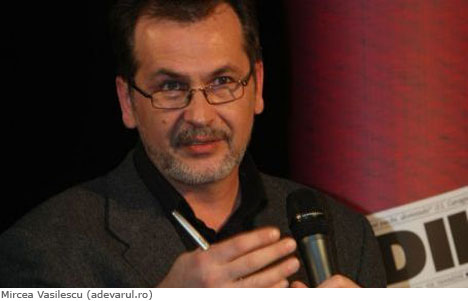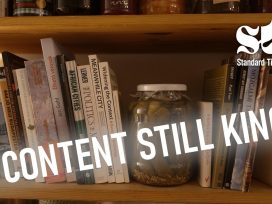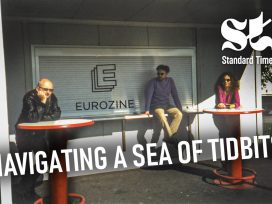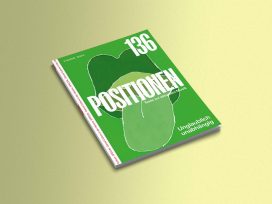“I wonder if in two to three years we’ll still have quality newspapers in Romania,” wonders Mircea Vasilescu, the editor-in-chief of Dilema veche, the Romanian weekly magazine which over two decades has become the best known and perhaps most respected in the country.
The situation of the Romanian press is, indeed, dire. In a country of 20 million people, the most popular quality dailies are selling 40,000 copies at the most; numerous big titles have closed down over the last couple of years, while those that remain have significantly reduced staff, switched to cheaper paper and made serious compromises on the quality of their content. “The Romanian press doesn’t carry reportages or investigations anymore and most papers no longer have people able to conduct proper work on the ground. Instead, they sit in offices and make news from the Internet,” comments Vasilescu. “Our press no longer has specific content.”
Vasilescu speaks from the new offices of Dilema Veche, a crammed apartment on a small side street in the centre of Bucharest, where, on a normal week day, Dilema veche‘s writers must conduct a complex choreography in order to work alongside one another. In April this year, the magazine was evicted from its previous offices after its owner, Adevarul Holding, failed to pay the rent for several months. Yet, as the old Romanian saying goes, “good people always fit together”, and this is the sense that being in the Dilema veche offices gives today: it’s tough times for the magazine, but it will pull through and discover creative solutions in the process.

At the beginning of March, the magazine introduced a pay wall for its online version. It now costs three euros a month and twenty-one euros a year to get online access to both the print editions of Dilema as well as web exclusive content. Dilema is the first publication in Romania to attempt to use paid-for access systematically, as a primary financing strategy. After the first month, over 500 users had acquired online passes, which the magazine considers “encouraging”. While debates on the forums of the magazine were heated, the loss of online readers has not been drastic: before the pay wall entered into force, the magazine averaged 150,000 unique readers monthly, a figure which looks like it will now stabilize at around 100,000. Between 7000 and 7500 print editions are sold weekly, a number that has remained stable throughout recent years.
“Dilema has existed for two decades and has changed editors three times, but all the while it has maintained a certain continuity, it has kept its style, its spirit, meaning that we’ve been able to create a committed readership,” says Vasilescu. “We’ve always tried to be ‘normal’ in the midst of the perpetual storm raging in the Romanian media and Romanian reality in general; we don’t get lost too much in immediate political and economic games and, even when we do comment on them, try to do so from another angle, to bring more intellectual or cultural perspectives into the debate. This is probably what has helped us to survive and gain the trust of our readers.”
“We have a small but committed readership,” continues Vasilescu. “Statistics show that our readers are the most educated and are among the highest earning of all Romanian newspaper buyers. This could also account for why we have not been seriously affected by the economic crisis, we have kept the same circulation numbers of around 7,000 since 2007, while the main dailies have decreased a lot over the last couple of years. Our readership is stable, and they can potentially pay for access to our online version.”
We talked to Mircea Vasilescu in mid-April, a few days after the move to the new office, and a month and a half after the introduction of the pay wall.
Claudia Ciobanu: Why was the introduction of the pay wall necessary?
Mircea Vasilescu: Theoretically, our kind of readership should make Dilema very attractive for online advertising. But it isn’t, and this is because the Romanian advertising market is rather immature, it would rather go for quantity over quality, meaning that advertising is mainly channelled towards television or publications with circulations. Although in fact, with the economic crisis, everyone is having problems with advertising incomes, since ad budgets have been reduced to a third of what they were before – from this perspective, Romania is right in line with the global tendency.
CC: The press is indeed struggling all over the world these days. Do you think Romania’s situation is particularly bad and, if so, why?
MV: There are several reasons why Romania’s situation is special. For one, in this country, the predominance of television is more powerful than anywhere else in Europe. Romanians watch on average 3-4 hours of television a day, and more at the weekend. This means that television stations set the public agenda, they are the ones to raise the issues and the ones to debate them. The press, on its part, has committed the error of being drawn into the race for audiences and, instead of doing something different to television, has chosen to copy what’s on TV. This has brought readers in the short term, but in the long term it has turned into a loss, since newspapers have become mere extensions of television instead of offering alternatives.
Another feature of Romania that has affected the press is a particularly poor distribution system: publications on subscription are distributed by the national postal service, which runs a primitive and unreliable network. Thirty percent of Romanians live in rural areas where there are no newspaper kiosks; if they want to make subscription they can’t rely on the papers reaching them on time. There are a few alternative distribution channels but they are regional and expensive.
Finally, the situation of the press in Romania is also a result of mistakes in management: in recent years we have seen the emergence on the media scene of a few corporations which – even though they brought positive changes in terms of organization and professionalism – were very much oriented towards fast profits as opposed to thinking up long-term strategies. What they have done is to follow the models of the television channels, looking for immediate gains, and have failed to calculate properly how to invest, which direction to take, how to strategize in the long-term; how to deal, for instance, with the emergence of the Internet, and how to create a specific content for print media. As a matter of fact, few were able to properly anticipate the impact of the Internet: many rushed to invest in websites for newspapers or magazines, which were done well and with a lot of good content, but they ended up cannibalizing the print editions. They attracted readers but they didn’t bring any financial gains, since online advertising is extremely cheap everywhere.
On the readers’ side, what we’re seeing is a new generation, for whom walking to the newspaper stand has become almost inconceivable. They prefer to spend their time online. In Romania, we have also seen a very abrupt increase in Internet use. We have very good net connections everywhere, even access on the mobile phones has become accessible. The youth today has grown up with the Internet, for them the press is passé, so we’re also seeing a sort of cultural change, in the sense that reading on paper is simply getting lost as a habit.
CC: These things could, however, conceivably be seen elsewhere in central and eastern Europe? Does Romania stand out in this region as well?
MV: In the 1990s, there was a period during which the press was perceived positively. People read lots of newspapers and magazines and one could say that the press was helping society advance. But then there were these mistakes made in press management, with the rush for profit destroying the specificity of the press. Although the press is struggling in other countries in the region, the climate there is slightly better: during the communist period, some publications existed that people could trust, meaning that people still turn to the press today. Some countries in the region have well-read weekly magazines or at least national versions of weeklies such as Business Week or Newsweek. This format never worked in Romania. In our country, we’re seeing people catching on very fast to new trends such as the Internet combined with the lack of a tradition of reading as it exists in western countries like Germany, the UK or France. Because over here the press is in a much worse state, people switched online without much regret.
CC: Is there any way the press in Romania could conceivably be saved?
MV: I think our press is beyond salvation. The recipe would have been to invest in content, to train competitive journalists; instead, press managers in Romania consider content as their very last priority and saw journalists as bureaucrats sitting at their desks and compiling news from the Internet. That’s why many good journalists have left the press, either migrating to television or PR work, because they simply weren’t able to do their job to a high standard any more.
CC: Should some of the media be financed by the state in order to ensure its existence and good quality output?
MV: I do not think that the state has any role to play here. The state, at least in Romania, is a bad administrator; if it offers financing, it will make demands and place conditions on content. In our country, the state is not a benign and neutral administrator, as it may conceivably be elsewhere. Plus, state subventions would come with very heavy bureaucracy. In Romania, state ownership of media is no guarantee of success: the national television channel makes huge losses, while the national radio channel has been making profits in the past few years; the main difference is good management in the case of the radio, on top of smaller running costs. In fact, in Romania, there are already a few state grants to support cultural press, but they are very small, they come after completing complicated bureaucratic procedures, and the money is paid out at the end of the year, meaning that you still have to find financing elsewhere in order to complete what you are doing.
Perhaps a solid foreign media trust with a lot of experience might have contributed to improving things in Romania. But, for some reason of which I am not sure, big foreign media corporations did not come here. We has the Swiss company Ringier for many years, but its is primarily interested in entertainment media. The only quality newspaper Ringier owned, Evenimentul Zilei, they have now sold to Romanian owners and it is not doing so well.
CC: Is the poor situation of the press representative of how culture fares generally in Romania?
MV: Yes, the same lack of long-term thinking affects the cultural domain in general. We don’t have proper cultural policies, neither the ministry responsible nor local authorities are able to properly identify the needs of the cultural sector and come up with 3-4 year plans which they then implement. The situation is the same in many sectors, not just in culture, but in culture successes are in fact cheaper and easier to achieve. A good example is the development of the city of Sibiu, which stems from the excellent theatre festival there; the success of this festival has attracted tourism, led to a boom in services and to the renovation and development of the entire city. It’s a powerful example.
Some positive things have been done: a few years ago, a research centre under the authority of the Ministry of Culture created an inventory of the entire cultural infrastructure of this country; this is a great starting point, it is important to know what we have, what we can make use of. But from here, we need to start building, and for that we need good administrators.
Don’t get me wrong, I’m not the one to say things like “our culture has died”! Not everything is over, things are happening, for instance there are so many books being published, even if the economic crisis has reduced numbers. Our main problems are management and communication. Many things are in fact happening in the cultural sector but we are struggling to communicate them to the public, to get the public to see them. Because it’s not true that people aren’t interested – they are. But we aren’t able to bring people together and communicate our messages to them.
CC: Since we are looking for signs of hope: do you see hope that online media can make up somewhat for the decline of the press in Romania?
MV: If the press disappears or has a very low impact then this poses problems for the solidity of democracy. The public agenda is set by television channels that, to a great extent, follow political and economic interests and treat important subjects superficially. Online media can compensate for the weakening of the press to some extent. It’s a lively and dynamic environment in Romania, themes of public interest are debated in a timely manner, and young people are very reactive online. I notice all of these things while following what happens with Dilema‘s social media channels. From the beginning, we wanted our Facebook profile to be less a promotion mechanism for our magazine and more a medium through which to share opinions and thoughts with our community. This has worked well, we have over 30,000 friends on Facebook and they are very lively. At the same time, not too much can be made out of the online reactivity of the youth: much of it stays there, online. For instance, a few weeks ago there was an attempt to organize a protest against ACTA in Romania: 50,000 Facebook users said they would attend but only 300 turned up. People lack hope.
Still, there are many interesting things happening in online media. For instance, while doing a recent issue on contemporary poetry in Romania, we found out that poetry – far from being dead – has simply moved online, with many poetry websites and blog commentaries. Publishing poetry online is much easier, there aren’t so many barriers and costs and many discussions and communities built around it have emerged. The same goes for literature in general: literary blogs nowadays have as much if not more impact than literary magazines.
CC: Amidst all this, what is Dilema‘s strategy?
MV: I was once asked by a new manager in our trust what exclusive Dilema would offer in the coming days. He was used to how the big dailies function, which once or twice a week at best have an exclusive, a story only they cover. My reply to him was: everything, everything is exclusive in Dilema. So we do run specific content, something the rest of the press in Romania doesn’t do any more. That’s why we’re hoping that the pay wall for the online version will work. In Romania, paying for getting news online would never work, but that’s not what we’re offering: we are offering content that can’t be read elsewhere. In general, it’s an illusion that online editions can be kept free forever: online publicity is too cheap to sustain that. We don’t have huge running costs, but we still need to cover them, to make sure we can preserve our independence, run a profit even, to make sure we will appear next year.
We also plan to gradually develop more online-only content, for instance e-books, or anthologies of texts previously published in our magazine that will be grouped thematically and made available only to those with online subscriptions. Printing these would be expensive and not make much sense. We’re also exploring the idea of online radio, starting with a one-hour music show with commentary published every Friday on our website. At the moment, most online radio stations in Romania are merely playlists, but there’s also a good example done by Gazeta Sporturilor (a sports daily).
Finally, another avenue for income is running events and festivals. Last year we organized a festival in Alba Iulia (in western Romania) with debates, concerts, theatre, movies. It took place in an eighteenth century fortress in the centre of the town that in communist times belonged to the army and that the local authorities are now trying to reconnect to the town community. We can play a part in that, while also promoting the magazine through a cultural event and attracting some revenue. At last year’s concert by violinist Alexandru Tomescu, 1,000 people crammed in the main cathedral, more than ever before, and the mayor confessed to us that he was happy. So, once more, people are ready for culture and quality things, we just have to figure out ways to bring it to them!
Towards the end of the interview, Vasilescu switches on his computer, goes to the Dilema page and clicks on the online music show. The music is retro, the DJ plays old charts from the 60s and 70s and discusses the songs and musicians. Vasilescu smiles, for the first time since the discussion started. It is certainly harsh times at Dilema, but the hope for this magazine might lie in the fact that it is being created by people who love what they do and who have a clear idea of what they want to say and whom they are saying it to.







